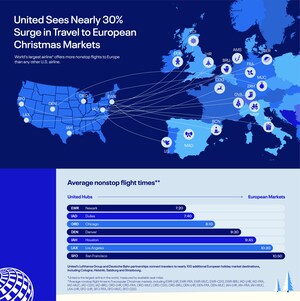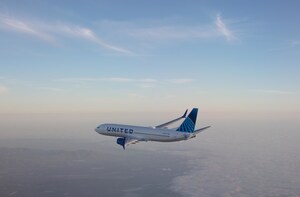United Sets Course To Be Best Airline For Employees, Customers, and Investors
Introduces further choice for customers with new Basic Economy fares; Expects to unlock $4.8 billion in value by 2020 with earnings initiatives; Updates narrowbody order book, reducing capital expenditures by approximately $1 billion by 2017 -2018
CHICAGO, Nov. 15, 2016 /PRNewswire/ -- United Airlines will present to its investors today plans for long-term earnings growth through a number of strategic initiatives across the airline. These initiatives include improving network connectivity and revenue management, broadening product segmentation and introducing additional customer enhancements. Along with maintaining disciplined cost control, this strategy is expected to generate $4.8 billion in earnings improvement by 2020.
"As we approach the new year, our operations are running well, our employees are more energized than ever, and we are ready to unlock United's full potential," said Oscar Munoz, chief executive officer. "Today, we are talking about what's next for United. We now have the strategy and organization in place to be the best airline in the world – for employees, customers and investors."
More Choice for Customers
To further meet customers' needs and provide more options to price-sensitive travelers, the company announced the introduction of Basic Economy fares. This new offering provides customers the option of paying the lowest fares to their destinations, while still receiving the same standard economy experience, including food, beverage, Wi-Fi and personal device entertainment, with a few key differences. Customers who choose Basic Economy will be assigned seats on the day of departure, be assigned to boarding group five and be permitted only one personal carry-on item that must fit under the seat. The new offering provides the added benefit for customers and employees of simplifying the boarding process, as fewer customers will bring overhead bags on board. Complete details on Basic Economy can be found at united.com/basiceconomy.
"Customers have told us that they want more choice and Basic Economy delivers just that," said Julia Haywood, executive vice president and chief commercial officer. "By offering low fares while also offering the experience of traveling on our outstanding network, with a variety of onboard amenities and great customer service, we are giving our customers an additional travel option from what United offers today."
In addition to Basic Economy, United will continue to offer economy, Economy Plus and domestic first class, and it remains on track to introduce its reimagined international premium travel experience, United Polaris, on December 1. The company is evaluating a new premium economy experience for domestic and international markets.
Optimize Network and Revenue Management
The company also announced its plans to fully optimize its network potential by continuing to leverage its leading international position while strengthening its domestic network, including improving the bank structures at key hubs in Chicago, Houston, and Newark/New York, and further improving both schedules and product in top business markets.
In addition, United is improving its revenue management system to more accurately forecast demand to better maximize profitability on each flight. The company expects these system improvements to drive $900 million of incremental revenue by 2019.
"We have the best people and network, with ever-improving products, and importantly have the most opportunity to improve our margins among our industry peers," said Scott Kirby, president. "As we strengthen both our domestic and international networks, we will ensure we are offering our customers the right flights to the right destinations at the right time."
Adjusting Aircraft Order Book
The company announced a modification to its narrowbody order book. The company is converting its original order for 65 737-700 aircraft into 4 737-800 aircraft to be delivered in 2017 while the remaining 61 will be converted into orders for 737 MAX aircraft, with delivery dates to be determined. These changes will allow United to take advantage of the superior fuel efficiency of the MAX aircraft while also reducing capital expenditures by approximately $1.6 billion through 2018.
In addition, the company has agreed to purchase 24 Embraer 175 aircraft from Embraer, instead of leasing these aircraft through a capacity purchase agreement as was originally planned. These aircraft will be leased to third party carriers operating as United Express.
"The realignment of our order book shifts our focus to ensuring our capital investments support earnings growth. We will continue to look at profitable opportunities in the new and used aircraft market to generate the highest ROIC," said Andrew Levy, executive vice president and chief financial officer. "We have made important investments in our people and product this year, and will continue to make investments in the business to ensure increased profitability while maintaining a strong balance sheet."
Continued Strong Cost Control
The company will continue its rigorous cost management program and expects 2017 unit costs to grow 3.5% to 4.5% excluding fuel. The company expects 2018-2020 unit costs excluding fuel to grow less than 1% per year due in part to its plan to remove $700 million of costs by 2020, as compared to 2015 levels.
Building on Current Success
United has made significant progress in operational reliability, with an improvement of nearly 10 percentage points year-to-date in on-time departures. The company plans to further improve performance with a specific focus on decreasing the time it takes to turn narrowbody aircraft, continuing to reduce long delays and cancellations, and executing on previously announced fleet reliability measures.
The company also is accelerating its mobile strategy, including next steps for its award-winning mobile app, which has more than 14 million downloads, expanding the types of transactions customers can make throughout their journey, including managing documentation for international travel and expanded rebooking options. In addition, the company made further progress this year in providing mobile tools to the majority of its operational employees.
United currently has ratified agreements for all of its employee groups, with the exception of its technicians, who are represented by the International Brotherhood of Teamsters. The technicians are expected to vote on their contract before the end of the year.
Webcast Details
United's 2016 Investor Day will begin today at 9:00 a.m. ET. A live, listen-only webcast of the presentations and question-and-answer session will be available at ir.united.com. The webcast will be available for replay within 24 hours of the conference call and then archived on the website for a limited time.
About United
United Airlines and United Express operate more than 4,500 flights a day to 339 airports across five continents. In 2015, United and United Express operated more than 1.5 million flights carrying more than 140 million customers. United is proud to have the world's most comprehensive route network, including U.S. mainland hubs in Chicago, Denver, Houston, Los Angeles, New York/Newark, San Francisco and Washington, D.C. United operates more than 720 mainline aircraft, and this year, the airline anticipates taking delivery of 21 new Boeing aircraft, including 737NGs, 787s and 777s, as well as six used Airbus A319 aircraft. The airline is a founding member of Star Alliance, which provides service to 192 countries via 28 member airlines. For more information, visit united.com, follow @United on Twitter or connect on Facebook. The common stock of United's parent, United Continental Holdings, Inc., is traded on the NYSE under the symbol UAL.
Safe Harbor Statement under the Private Securities Litigation Reform Act of 1995:
Certain statements included in this press release are forward-looking and thus reflect our current expectations and beliefs with respect to certain future events and anticipated financial and operating performance. Such forward-looking statements are and will be subject to many risks and uncertainties relating to our operations and business environment that may cause actual results to differ materially from any future results expressed or implied in such forward-looking statements. Words such as "expects," "will," "plans," "anticipates," "indicates," "believes," "forecast," "guidance," "outlook," "goals" and similar expressions are intended to identify forward-looking statements. Additionally, forward-looking statements include statements that do not relate solely to historical facts, such as statements which identify uncertainties or trends, discuss the possible future effects of current known trends or uncertainties or which indicate that the future effects of known trends or uncertainties cannot be predicted, guaranteed or assured. All forward-looking statements in this press release are based upon information available to us on the date of this press release. We undertake no obligation to publicly update or revise any forward-looking statement, whether as a result of new information, future events, changed circumstances or otherwise, except as required by applicable law. Our actual results could differ materially from these forward-looking statements due to numerous factors including, without limitation, the following: our ability to comply with the terms of our various financing arrangements; the costs and availability of financing; our ability to maintain adequate liquidity; our ability to execute our operational plans and revenue-generating initiatives, including optimizing our revenue; our ability to control our costs, including realizing benefits from our resource optimization efforts, cost reduction initiatives and fleet replacement programs; our ability to utilize our net operating losses; our ability to attract and retain customers; demand for transportation in the markets in which we operate; an outbreak of a disease that affects travel demand or travel behavior; demand for travel and the impact that global economic conditions have on customer travel patterns; excessive taxation and the inability to offset future taxable income; general economic conditions (including interest rates, foreign currency exchange rates, investment or credit market conditions, crude oil prices, costs of aircraft fuel and energy refining capacity in relevant markets); economic and political instability and other risks of doing business globally; our ability to cost-effectively hedge against increases in the price of aircraft fuel; any potential realized or unrealized gains or losses related to fuel or currency hedging programs; the effects of any hostilities, act of war or terrorist attack; the ability of other air carriers with whom we have alliances or partnerships to provide the services contemplated by the respective arrangements with such carriers; disruptions to our regional network; the costs and availability of aviation and other insurance; industry consolidation or changes in airline alliances; competitive pressures on pricing and on demand; our capacity decisions and the capacity decisions of our competitors; U.S. or foreign governmental legislation, regulation and other actions (including open skies agreements and environmental regulations); the impact of regulatory, investigative and legal proceedings and legal compliance risks; the impact of any management changes; labor costs; our ability to maintain satisfactory labor relations and the results of the collective bargaining agreement process with our union groups; any disruptions to operations due to any potential actions by our labor groups; weather conditions; and other risks and uncertainties set forth under Part I, Item 1A., "Risk Factors," of UAL's Annual Report on Form 10-K for the fiscal year ended December 31, 2015, as well as other risks and uncertainties set forth from time to time in the reports we file with the U.S. Securities and Exchange Commission.
UNITED CONTINENTAL HOLDINGS, INC.
NON-GAAP FINANCIAL RECONCILIATION
UAL evaluates its financial performance utilizing various accounting principles generally accepted in the United States of America (GAAP) and Non-GAAP financial measures, including operating income (loss) excluding special items, operating margin excluding special items, and consolidated unit cost (CASM), as adjusted, among others. CASM is a common metric used in the airline industry to measure an airline's cost structure and efficiency. UAL reports CASM excluding profit sharing, third-party business expenses, fuel, and special charges. UAL believes that adjusting for special charges is useful to investors because special charges are non-recurring charges not indicative of UAL's ongoing performance. UAL believes that excluding third-party business expenses, such as maintenance, ground handling and catering services for third parties, fuel sales and non-air mileage redemptions, provides more meaningful disclosure because these expenses are not directly related to UAL's core business. UAL also believes that excluding fuel costs from certain measures is useful to investors because it provides an additional measure of management's performance excluding the effects of a significant cost item over which management has limited influence. UAL excludes profit sharing because this exclusion allows investors to better understand and analyze our recurring cost performance and provides a more meaningful comparison of our core operating costs to the airline industry.
| UNITED CONTINENTAL HOLDINGS, INC. |
||||||||||
| NON-GAAP FINANCIAL RECONCILIATION (continued) |
||||||||||
| Twelve Months Ended December 31, 2017E |
||||||||||
| Non-Fuel CASM Consolidated Operations (year-over-year percentage change) |
Low |
High |
||||||||
| CASM, excluding special charges and profit sharing (a) |
4.9 |
% |
6.7 |
% |
||||||
| Less: Third-party business expenses |
(0.2) |
0.0 |
||||||||
| CASM, excluding special charges, profit sharing and third-party business expenses |
5.1 |
6.7 |
||||||||
| Less: Fuel expense |
1.6 |
2.2 |
||||||||
| CASM, excluding special charges, profit sharing, third-party business expenses and fuel |
3.5 |
% |
4.5 |
% |
||||||
| (a) Excludes special charges, such as the impact of certain primarily non-cash impairment, severance and other similar accounting charges. While the Company anticipates that it will record such special charges throughout the year, at this time the Company is unable to provide an estimate of these charges, as well as an estimate of full-year profit sharing, with reasonable certainty. |
Logo - http://photos.prnewswire.com/prnh/20130404/MM89155LOGO
SOURCE United Airlines
Related Links
WANT YOUR COMPANY'S NEWS FEATURED ON PRNEWSWIRE.COM?
Newsrooms &
Influencers
Digital Media
Outlets
Journalists
Opted In





Share this article